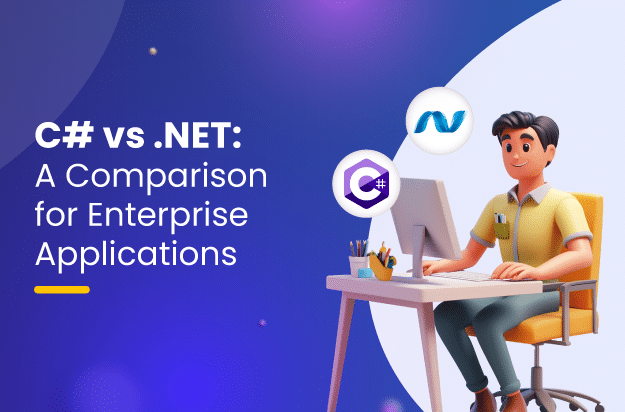C# vs .NET: A Comparison for Enterprise Applications


There are only limited options available for building enterprise-level software. C# and .NET are two of the most popular names that frequently come in such discussions. These enable developers to build powerful and scalable applications. Even though these are often mentioned together, they are distinct and serve complementary roles in the development process.
Understanding their individual roles, differences, and how they complement each other can reveal their roles in enterprise software development. This knowledge will help choose the right tools for the job and ensure that development teams can fully utilize each other’s strengths.
This blog will give a clear picture of C# and .NET, highlighting their unique features, interdependencies, and suitability for enterprise applications. By the end, you’ll have a clear understanding of how these technologies work together and why hiring C# developers who can effectively harness the power of the .NET framework to build high-quality, scalable enterprise solutions is essential.
What is C#?
C# is a modern language developed by Microsoft as a part of its .NET initiative. It is an object-oriented programming language that combines the best of C++ and Java, making it a versatile tool for developers.
Primary Features of C# Apt for Enterprise Applications
C# offers several features that make it desirable for building enterprise applications. These include strong tying, garbage collection, exception handling, and support for asynchronous programming. The new features and enhancements of C#12 further make development easier and more productive.
Other desirable traits include its robustness, scalability, and ease of integration with other Microsoft products and services. This is further complemented by interoperability with different languages and platforms and an extensive library.
This combined offers developers a robust, easy-to-work-with, and feature-rich package, allowing them to build complex, high-performance enterprise applications efficiently. Some common applications developed using C# are enterprise software, web applications, cloud-based services, and large-scale data processing systems.
What is .NET?
.NET, created by Microsoft, is a software development framework. It provides a controlled environment for developing and running a wide variety of applications from desktop to web and cloud-based enterprise software.
Primary Features of .NET Apt for various types of Development
.NET supports multiple programming languages, including C#. It features a large class library known as the Framework Class Library (FCL), and a runtime environment called the Common Language Runtime (CLR).
Besides these tools, libraries, and runtime environments designed to streamline the development, the framework also offers advanced tools for debugging, testing, and deploying applications. This makes it a comprehensive solution for enterprise application development.
Relationship Between C# and .NET
Although both are developed by Microsoft, one is a programming language, and the other is a framework. C# is created to be used within the .NET framework, utilizing its extensive libraries and favorable runtime environment.
The close integration, due to being developed by the same company focusing on it, makes them ideal for developers to use C# and the full capabilities of the .NET framework. This coordination between C# and .NET enables developers to create high-performing enterprise applications efficiently.
The combination of C# and .NET is invaluable for an enterprise environment where integration with existing systems, performance, and security are topmost priorities. Together, they are ideal for building and maintaining even the most complex enterprise software. Depending on the project requirements, businesses often look to hire .NET developers to utilize its favorable features for enterprise software development.
What Are the Core Differences Between C# and .NET?
C# is the foundational language, while .NET offers the necessary infrastructure to bring enterprise applications to life. Here are the basic differences between the two briefly.
C#
- A programming language
- Provides developers with the syntax, constructs, and paradigms needed to write code
- Enables developers to build complex applications with clear and concise code.
.NET
- A development framework
- Offers the environment in which that code is executed, managed, and optimized.
- Provides a vast array of libraries, tools, and runtime support for the entire software development lifecycle, from coding to deployment.
Use Cases and Flexibility
Both C# and .NET are highly flexible, supporting more than just each other for varied use cases of development needs.
- C# can be used with frameworks like Unity for game development, Xamarin for mobile applications, and more.
- .NET inherently offers multi-language support beyond C# to other languages, such as F# and VB.NET.
Together, their compatibility with each other and support beyond it makes them valuable for developing various use cases, such as enterprise applications from web to desktop and cloud-based solutions.
Learning Curve and Developer Skills
Even though C# is designed to be accessible, there is still a learning curve for developers new to object-oriented programming or with different backgrounds. Mastering C# requires knowledge of syntax, object-oriented principles, and advanced features such as LINQ and asynchronous programming.
For efficient enterprise application development, a deep familiarity with the .NET framework and expertise in C# are essential. This includes an understanding of the ecosystem of libraries, tools, and runtime environments. Thus, businesses can hire expert .NET developers to maximize the potential of this framework and its components.
Performance and Scalability in Enterprise Applications
The combination of C# and .NET framework offers an impressive mix of performance and scalability for enterprise applications.
Performance of C# in High-Load Environments
Here are a couple of top features that show why C# is a reliable choice for developing enterprise software that needs to handle large volumes of transactions or user interactions.
- Efficient Memory Management – C# offers efficient memory management support from the .NET framework’s garbage collection system, which reduces the risk of memory leaks. This system automatically manages memory allocation and deallocation, improving the overall stability of the application.
- Just-in-time Compilation – This refers to code conversion into machine language just before execution. This optimizes performance based on the current runtime environment.
Features of the .NET Framework
The .NET framework provides a range of helpful features that make it ideal for enterprise applications that prioritize scalability.
- Modular Architecture – The .NET framework allows developers to build applications using a microservice approach. This means individual components can be developed, deployed, and scaled independently.
- Built-in Features – The .NET framework offers several built-in features, such as load balancing and caching. These help reduce latency, manage performance, and distribute workloads efficiently across multiple servers.
- Distributed Computing – The .NET framework supports distributed computing to enhance scalability further. This is crucial for enterprise applications, enabling them to perform reliably even under heavy load.
Security Features of C# and .NET for Enterprise Applications
Both C# and .NET offer a range of comprehensive security features. Let’s take a look at them in detail.
Security Features in C#
C# features incredible handling, which contributes immensely to overall security. It reduces the chances of unexpected errors that can be exploited and allows C# developers to manage the mistakes gracefully in the case of one. Here are the two top security-related features that make it ideal for enterprise applications.
- Type Safety – This ensures that variables and objects are used consistently according to their data types. This reduces the risk of type-related vulnerabilities and errors.
- Code Access Security (CAS) – This feature allows developers to control the permission of code running in their applications. This is vital for preventing unauthorized access.
Security in the .NET Framework
The .NET framework offers a comprehensive security model to reduce threats and protect enterprise software from data breaches and cyberattacks.
- Authentication and Authorization – The .NET framework features mechanisms that allow developers to implement a secure login process. This helps control access to different information based on the user’s role.
- Data Protection – The .NET framework offers features such as encryption and secure data transmission protocol. This protects data at rest and in transit.
- Defense against Common Security Threats – The .NET framework features provide ample protection against common security threats, such as SQL injection and Cross-Site Scripting (XSS).
Development Tools and Ecosystem
Together, C# and .NET offer a holistic development suite of tools and an ecosystem capable of meeting even the most complex enterprise software development needs.
Development Environment for C#
C# developers benefit from a robust development environment, primarily centered around tools like Visual Studio, Visual Studio Code, and other integrated development environments (IDEs) that support C# development. Here are two of the most popular development environments.
- Visual Studio – It is the flagship IDE for enterprise software development. It offers a full range of tools that streamline everything from coding to debugging to testing.
- Visual Studio Code – It is a lighter and more flexible editor. It is popular among C# developers who prefer a streamlined development environment as it supports C# development through extensions.
.NET Ecosystem and Libraries
The .NET ecosystem is one of the most extensive and versatile in enterprise software development. Here are a couple of popular frameworks that drastically simplify the process of building enterprise applications.
- ASP.NET Framework- It is a powerful framework for developing web applications and services. It offers features like MVC architecture, Razor pages, and strong authentication mechanisms.
- Entity Framework—It offers an object-relational mapping (ORM) solution that simplifies database interactions. It allows .NET developers to focus on business logic rather than SQL queries.
Community and Support
Beyond the extensive tools and ecosystem for enterprise software development, both have a vibrant and active developer community. This helps tremendously to gain access to tools and knowledge for overcoming common challenges and building successful enterprise applications. Here are some highlighting features of the community and support.
- Third-party libraries and open-source projects.
- Insight into existing solutions.
- Regular updates, security patches, and best practices.
Cost and Licensing Considerations
Understanding the cost implications of using C# and .NET is crucial for enterprise software development regarding the return on investment (ROI). Traditional .NET frameworks, depending on the enterprise environment, may require licensing from Microsoft products. However, there is an open-source platform, .NET Core(now .NET 5 and later), that greatly reduces these costs. This open-source approach is ideal for deployment across different platforms, including Windows, Linux, and macOS.
Compared with Other Enterprise Solutions
Java, Python, and Node.js are three of the most popular alternatives for enterprise software development. Let’s compare it to C# and .NET frameworks in the context of ROI.
- Java requires higher costs related to Oracle licensing, especially for large-scale deployment.
- Python is resource-intensive for enterprise software. It requires more resources for the same level of performance and optimization.
- Node.js simply lags behind in terms of providing robust enterprise-level frameworks.
Thus, C# and .NET provide a better combination of ROI and performance regarding enterprise software development cost and the application’s future prospects.
How Do C# and .NET Complement Each Other in Enterprise Development?
There are several ways in which C# and .NET complement each other, making them an ideal combination for enterprise software development.
Building Robust Applications
C# and .NET work seamlessly together, complementing each other. On the one hand, C# offers features like strong typing, Language Integrated Query (LINQ), and asynchronous programming (async/await). These ensure code reliability, maintainability, and efficiency in enterprise application development.
Similarly, .NET offers a rich set of components, such as ASP.NET and Entity Framework. These allow the creation of dynamic, responsive web applications and simplify database interactions. Together, C# and .NET help developers address the demands of even the most complex enterprise software development.
Cross-Platform Development with .NET Core
The introduction of .NET Core has dramatically enhanced the capabilities of C# and .NET for cross-platform development, allowing developers to build applications that run on multiple operating systems. C# is the primary language used within .NET Core. This will ensure consistency and reduce development costs while delivering high-quality, cross-platform enterprise software.
Integration with Other Technologies
One of the biggest strengths of C# and .NET, essential for enterprise application development, is their natural integration with other Microsoft technologies, such as Azure, SQL Server, and Microsoft 365. Thus, enterprise software relying on Microsoft-centric infrastructure greatly benefits from it, leading to a cohesive and integrated solution. The tight integration can take advantage of the full stack of Microsoft’s technology, resulting in streamlined operations, improved performance, and enhanced business agility.
Conclusion
C# and .NET standalone offer a range of advantages and feature sets that make them favorable for enterprise software development. However, together, they offer an impeccable package that strikes a perfect combination of features, ease, and ROI. Thus, the combination of C# and .NET offers a marked advantage over the competing market alternatives for businesses looking to build a high-performing enterprise software application. This is true whether building a new application from scratch or modernizing an existing system. It offers a powerful, flexible, and future-proof solution for enterprise application development.









